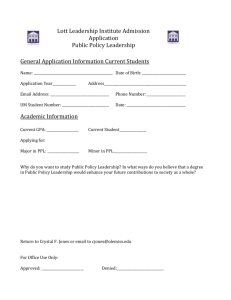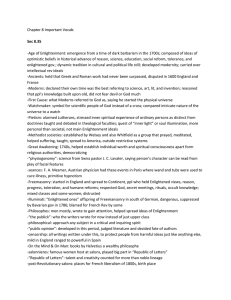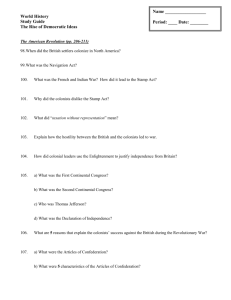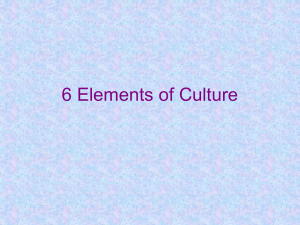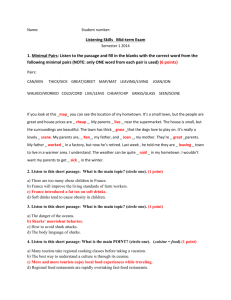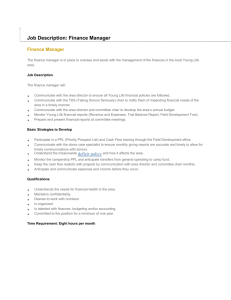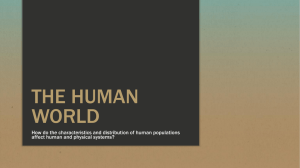ch 17 - wilsonworldhistory1213
advertisement
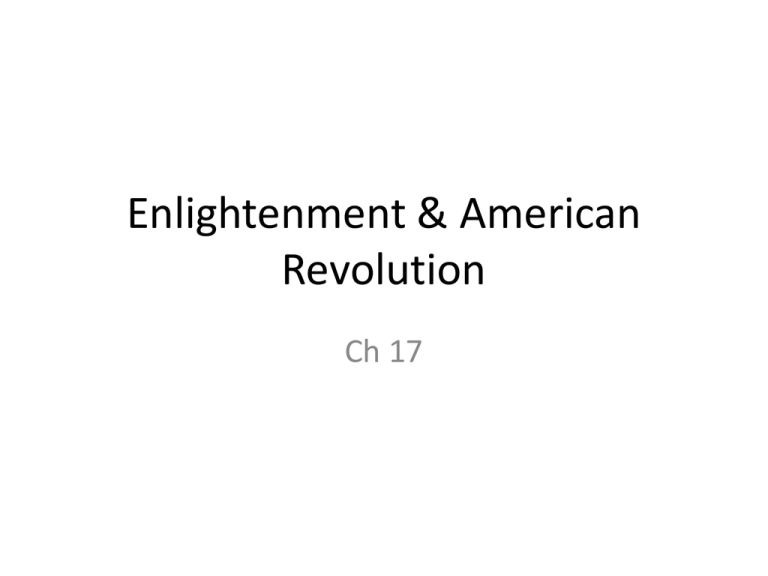
Enlightenment & American Revolution Ch 17 Philosophy in the Age of Reason Sec 1 Natural Law • Who: Europeans • What: rules that are discoverable by reasoning that governed scientific forces such as gravity & magnetism • Where: Europe • When: 1500s-1600s • Why: scientific success convinced educated Europeans of the power of human reason; used to better understand social, economic, & political probs; used this to study human behavior & solve probs = led to the Enlightenment Thomas Hobbes • Who: 17th century English thinker • What: set forth ideas that were to become key to the Enlightenment ; wrote “Leviathan” • Where: England • When: 1700s • Why: he lived through upheavals in the English Civil War; outlined his ideas in “Leviathan”= argued that ppl were naturally cruel, greedy & selfish; he said that ppl entered into “Social Contract” to avoid brutal life; best gov’t= Absolute Monarchy John Locke • Who: 17th century English thinker • What: set forth ideas that were to become key to the Enlightenment • Where: England • When: 1700s • Why: he thought ppl were reasonable & moral; ppl had certain natural rights: life, liberty, & property; came to very diff ideas about the human nature & role of govt= govt has obligation to its ppl, if it fails, it fails the ppl = if govt violates natural rights = ppl have a right to overthrow= American & French Revolutions Social Contract • Who: European ppl; Thomas Hobbes • What: an agreement where ppl gave up their freedom for an organized society • Where: Europe • When: 1500s-1600s • Why: Hobbes said that ppl entered into this agreement to escape the brutish lifestyle; believed a powerful govt = orderly society; promoted Absolutism Natural Right • Who: John Locke • What: rights that belonged to all humans on earth such as life, liberty, & property • Where: England • When: 1700-1800s • Why: Locke believed ppl are reasonable & moral= they have rights from birth; ppl had a right to overthrow a govt if these rights were violated = American & French Revolutions Philosophe • Who: French Enlightenment thinkers/philosophers • What: they believed the use of reason could lead to reforms of gov’t, law, & society • Where: France, Europe • When: 1700s • Why: this group of thinkers started Enlightenment thought = spread throughout Europe & beyond; applied methods of science to improve society Montesquieu • Who: an early influential thinker; a philisophe • What: studied the gov’ts of Europe & learned about Chinese & Native Am. Cultures; wrote “Sprit of Laws” • Where: France, Europe • When: 1689-1748 • Why: his sharp criticism of Absolutism = debate; in order to protect liberty the gov’t should be divided into 3 branches; idea taken by framers of US Constitution; wrote “Persian Letters”= ridiculed French Gov’t Lab- ch 2 lab packet & Budget Hero Voltaire • Who: a Philosophe, poet & historian • What: an imprisoned poet, historian, essayist & philosopher • Where: Paris, France • When: 1694-1778 • Why: he detested the slave trade; deplored religious prejudice; defended principle of freedom of speech; his new ideas= imprisoned & forced into exile Diderot • Who: a Philosophe, editor of the Encyclopedia • What: he produced a 28-volume set of books called the Encyclopedia • Where: Europe, the Americas • When: 1751-1789 • Why: he wanted to change the general way of thinking by explaining ideas on topics such as gov’t, philosophy, religion = urged education for all ; included articles from Montesquieu & Voltaire; denounced slavery & praised freedom of expression Rousseau • Who: Jean-Jacques Rousseau; a Philosophe • What: created the Social Contract (book) society placed too many limitations on ppl’s behavior; believed that ppl were basically good • Where: France • When: 1762 • Why: believed in good will & best conscience of the ppl; he showed great hate for oppression; his ideas= American & French Revolutions; influenced social & political reformers for over 200 years Laissez-Faire • Who: French thinkers; Adam Smith • What: a policy allowing business to operate w/ little or no gov’t interference • Where: France, • When: 1700-1800 • Why: this rejected Mercantilism= gov’t controls the economy to reach a favorable balance of trade; this supported free trade & opposed tarriffs Adam Smith • Who: Scottish Economist • What: In his influential work “Wealth of Nations” he advocated for the free market should be allowed to regulate business activity • Where: Scotland, Europe, Americas • When: 1800-1900s • Why: he was a strong supporter of Laissez-Faire; felt gov’t should only administer justice & provide public work; his ideas= shape productive economies in 1800-1900s Rococo • Who: Architect & Designers • What: Personal, elegant style of art & architecture made popular that featured designs. • Where: Paris, France • When: 1600’s-1700’s (mid) • Why: Rococo art moved away from religion unlike, Baroque. Rococo was believed to encourage imagination. Portrait showed noble subjects in charming rural settings, surrounded by happy servants. Despite it being criticized it had a vast of people in upper class & graving middle class. Enlightenment Ideas Spread Sec 2 Censorship • • • • • Who: European writers What: restricting access to ideas & info Where: France, Europe, Americas, Middle East When: 1700s Why: Authorities had to defend the “Old order” that God had set up agnst the writers’ new ideas= banned all books & burn books & imprison the writers= writers disguise their ideas in fiction Salons • Who: writers, artists ,& philosophers; French women • What: an informal social gathering for women in their homes • Where: Paris, France • When: 1600-1700s • Why: it started in 1600s- noblewomen began inviting friends to their homes for poetry readings; by 1700s it flourished- middle class women are now invited= equal footing = discuss & spread enlightenment ideas Baroque • Who: Greek & Romans • What: Courtly art and architecture were neither in the Greek and Romans tradition or in a grand, ornate style. • Where: Europe • When: 1600’s-1700’s • Why: Baroque paintings were huge, colorful, and full of excitement. They glorified historic battles or the lives of the saints. Such works matched the grandeur of the European courts at that time. Enlightenment Despot • Who: Monarchs, Frederick the Great, Joseph II, and Catherine the Great • What: Those that accepted enlightenment ideas. • Where: Europe • When:1700’s • Why: they were absolute rulers who used their powers to bring about political and social change. These philosophies convinced rulers that change and reform was necessary. Frederick the Great • Who: King of Prussia • What: Exerted &extremely tight control over his subjects. • Where: 1740-1786 • When: Prussia • Why: He saw himself as the “First servant of the state,” with a duty to work for the common good. He openly praised Voltaire’s work. He reduce the use of torture and allow a free press. He recognized the governments civil service and simplified laws, the tolerated religious differences. Catherine the Great • Who: Catherine II, Empress of Russia, Enlightened Despot • What: she believed in the Enlightenment ideas = Enlightened Despot = used those ideas to bring about change • Where: Russia • When: 1761• Why: made limited reforms in law & gov’t, abolished torture & est. religious tolerance; granted nobles charter of rights Joseph II • Who: Maria Theresa’s son & successor; Enlightened Despot • What: traveled in disguise among his subjects to learn about their probs; brought reforms to Austria (Enlightened Despot) • Where: Austria • When: 1700-1800s • Why: his reforms began to modernize Austria’s gov’t; supported religious equality for Protestants & Jews in his Catholic empire American Revolution Sec 3 George III • Who: English King • What: new English king that set out to restore powers for England that the crown had lost to the colonies • Where: England • When: 1760-1820 • Why: he set out to reassert royal power over the colonies; he wanted to end Whig domination; dissolves cabinet system in colonies ; made Parliament follow his own will; his policies were disastrous= colonists MAD; taxing the American colonies = Revolution! Stamp Act • Who: King George III vs colonists • What: an imposed tax on items such as newspapers & pamphlets • Where: England to American Colonies • When: 1765 • Why: the 7 years war/French & Indian war drained English treasury = King George III thought the colonies should pay = Sugar Act & Stamp act (Taxes them) = made the colonists mad = American Revolution George Washington • Who: soldier & political & social leader • What: commander of the continental Army (Colonists’ army) & 1st president of the USA • Where: Virginia, Americas • When: 1732-1789 • Why: led the American Army against the British; incorporated order & discipline- strong leader; he enforced strength & determination in the colonists’ army = they won the American Revolution= The independent United States Thomas Jefferson • Who: principal author of Declaration of Independence, Virginian • What: he wrote the Dec of Ind- the most important document to the US • Where: Virginia, America • When: 1776 • Why: he reflected John Locke’s ideas of the people’s rights of life, liberty, property in the Dec of Ind; the document protected the ppl’s rights of a free country; this document is the basis of the United States’ freedom & is still present as our freedom today Popular Sovereignty • Who: John Locke • What: a theory that states that all gov’t power comes from the ppl; imp. Part of the Dec of Ind • Where: Virginia, United States • When: 1776 • Why : this argued that the colonists had the right to rebel against unjust gov’ts = Am. Rev. = Colonists form their own politically sovereign govt Yorktown, Virginia • Who: French, British, American Colonists • What: French/American fleet blockaded Chesapeake bay which forced the British to surrender to GW & Americans • Where: Yorktown, VGA • When: 1781 • Why: British effort crumbled= Treaty of Paris (ended the war)= British now recognized the independence of the USA Treaty of Paris • Who: British, French, Americans • What: the treaty that ended the American Revolution • Where: United States • When: 1781 • Why: this ended the Am Rev= The British had to recognize America as an independent nation James Madison • Who: Constitutional Convention’s floor leader • What: helped write the Constitution & became a respected American leader • Where: Philadelphia, PA, USA • When: 1751-1836 • Why: he created a federal republic (the new gov’t) along w. the other framers of the constitution; his document (Constitution) est a gov’t for the ppl, by the ppl Benjamin Franklin • Who: a national leader in the Am Rev • What: the nation’s leaders met in secret to redraft the Articles of the new constitution of the United States- wrote the Constitution • Where: Philadelphia, PA, USA • When: 1787 • Why: he helped write the US Constitution = this est. a gov’t for the ppl, by the ppl Federal Republic • Who: Americans • What: a gov’t in which power is divided by the nation (federal govt) and the states (local) • Where: USA • When: 1780s • Why: the Constitution created this gov’t for the USA- the newly independent country after the Am Rev; Republic- ppl are represented and have a say; we have this govt today in the USA
